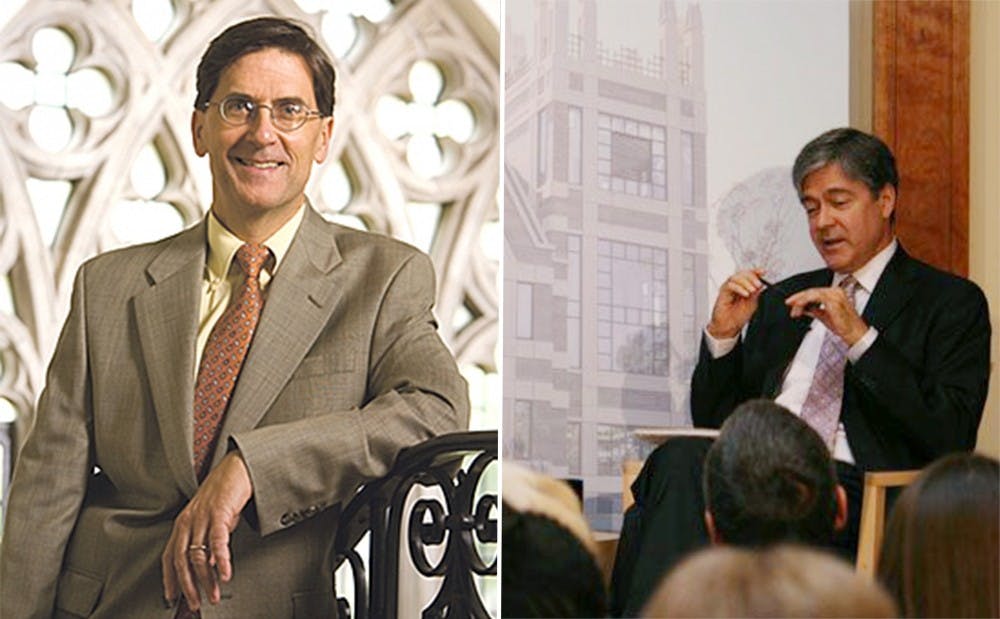Duke is mentioned frequently in the hacked emails of John Podesta, Democratic presidential candidate Hillary Clinton's campaign chairman.
Since the initial release last week, WikiLeaks has published 17,150 of Podesta’s emails, mostly from 2015 and 2016. As chairman of the Clinton campaign and President Bill Clinton’s former chief of staff, Podesta was privy to information about Clinton’s private and public affairs and weighed in on strategy discussions. In a review of released emails, here are five of the most interesting references to Duke University, alumni and affiliates.
1. Richard Riddell
Richard Riddell, who serves as vice president and university secretary at Duke, is also the chair of the Knox College Board of Trustees, of which Podesta is a trustee emeritus.
The WikiLeaks release included several emails that Riddell sent from his Duke email account to the Knox College Board of Trustees, including Podesta, about the board's proceedings and meeting summaries.
“I check my Duke account constantly, so it’s more likely that I’ll see it if [the Board of Trustees] write[s] me at my Duke account,” Riddell explained when asked why he used his Duke email address in the correspondence.
Although Riddell noted that his emails did not contain sensitive information, he added that email has become an unreliable means of communicating.
“You don’t like it, it wasn’t meant to be made public, it was meant for the people that received that email. You’d prefer that that’s the way it stayed, but clearly that didn’t happen, so you deal with it,” he said. “Email is a way of communicating that’s very convenient, but clearly not the most secure way of communicating."
2. John Harwood
John Harwood, Trinity ’78 and former staff member at The Chronicle, is chief Washington Correspondent for CNBC and a contributor to The New York Times. He emailed Podesta numerous times with requests to interview Clinton.
“I want to interview HRC about her plans for the economy,” Harwood wrote in a March 3, 2015 email to Podesta.
“With me, it will be the kind of substantive, deep, textured conversation about the economy she wants,” he wrote in another email sent Nov. 24, 2015.
Almost nine months later, Harwood again inquired about interviewing Clinton in email titled “btw…” sent to Podesta in August.
Besides interview requests, other emails between Harwood and Podesta reveal more casual correspondence.
“Btw congrats on climate deal that you had a lot to do with,” wrote Harwood in an email congratulating Podesta on the 2015 Paris Climate Accord.
“Get together for coffee or a beer in Brooklyn on Thurs afternoon?” asked Harwood in the subject line of an email sent Jan. 4, 2016. However, Podesta’s staff were wary of Harwood’s friendly request; they noted in other communications that they still suspected Harwood was trying to secure an interview with Clinton.
Harwood could not be reached for comment in time for publication.
3. Stelios Papadopoulos
In October of 2008, Podesta received an email concerning the health of Fred Baron, a fundraiser for the Democratic Party. The email described how Baron had been diagnosed with a form of multiple myeloma and contained a plea from his wife, Lisa Baron, for help in obtaining an experimental drug to treat his cancer, which he had previously been denied access to.
The email listed several senior administrative officials from Biogen—the company which had developed the drug—including Dr. Stelios Papadopoulos, the Chairman of Biogen’s Board of Directors and a member of Duke Health’s Board of Visitors and the Global Advisory Board of the Duke Institute for Health Innovation.
Posteda, in addition to former Senator John Kerry and President Bill Clinton among others, was urged to petition the FDA and Biogen officials, like Papadopoulos, to give Baron access to the drug.
Papadopoulos could not be reached for comment in time for publication through the Biogen board.
4. The Chronicle
In January of 2009, Podesta was given an analysis of a new book, "Guilty: Liberal "Victims" and Their Assault on America," which was written by conservative author and media personality Ann Coulter.
The email fact-checked many of the book’s claims, and referenced Duke in one of its sections.
In her book, Coulter described a 1997 incident at Duke in which a brown doll was hung from a noose on campus.
“Coulter claims that two black students who engaged in a hoax by hanging a black doll from a noose were 'immediately praised by 'liberals,' but the sources she cites do not support this claim,” the email from Karl Frisch, communications director for Media Matters for America, states.
According to the email, one of the sources that Coulter had used was a letter to the editor in The Chronicle written in November of 1997 by Worokya Diomande, Trinity ’98. The email emphasized that Coulter generalized the ideas presented in one opinion piece as representative of the University at large.
5. Basketball
Then-Republican presidential candidate John McCain held a rally in Fayetteville, N.C. during October of 2008.
Podesta was sent an email with background details of the event and highlights from its transcript, including a reference to a Duke basketball game.
“John, if I didn't know better, we're at the Duke basketball game,” said former Secretary of Homeland Security Tom Ridge to McCain during the rally.

Get The Chronicle straight to your inbox
Signup for our weekly newsletter. Cancel at any time.

